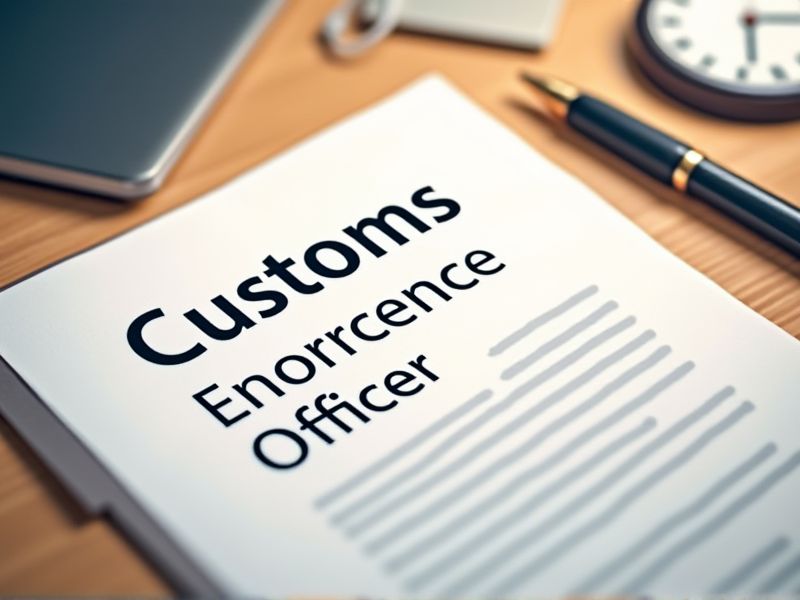
Customs Enforcement Officers require specific certifications to ensure they possess the essential knowledge and skills needed to effectively monitor and regulate cross-border activities. Proper certifications validate an officer's understanding of international trade laws and the complexities of customs procedures. These credentials also ensure an officer is adequately trained in handling potentially hazardous materials and detecting illegal goods. Here are several key certifications that may be necessary for a role as a Customs Enforcement Officer.
Customs Enforcement Officer Basic Training Certification
Customs Enforcement Officer Basic Training Certification provides foundational knowledge of customs laws and regulations, leading to more effective enforcement. The certification ensures officers understand the necessary procedures, which reduces the risk of customs violations. Training enhances critical decision-making skills, which lowers the incidence of errors during inspections. Certification formalizes competence, building public trust and international cooperation in trade compliance efforts.
Advanced Customs Compliance Certification
Advanced Customs Compliance Certification enhances the skills and knowledge of Customs Enforcement Officers, enabling them to effectively enforce trade regulations and prevent smuggling activities. This certification equips officers with up-to-date information on international trade laws, facilitating smoother cross-border transactions and reducing delays. By understanding complex compliance requirements, officers can identify and mitigate potential threats to national security more efficiently. The certification also promotes a standardized approach among officers, ensuring consistency and accuracy in the enforcement of customs policies.
Trade Compliance Certification
Trade Compliance Certification equips Customs Enforcement Officers with comprehensive knowledge of international trade laws, enhancing their ability to enforce regulations effectively. Officers with certification are better prepared to identify and prevent illegal trade practices, such as smuggling and fraud. Certification also ensures that officers are up-to-date with global trade agreements, reducing the risk of non-compliance penalties for their country. It contributes to streamlined border processes, increasing efficiency in trade flow while maintaining legal integrity.
Customs Broker License
Customs Broker Licenses enable Customs Enforcement Officers to comprehensively understand import regulations and tariff schedules, leading to more effective enforcement. The licensed knowledge helps in identifying potential violations or inaccuracies in documentation, reducing instances of customs fraud. Understanding specific import and export requirements allows officers to facilitate smoother trade flow while maintaining compliance standards. Legal clarity obtained through the license equips officers with the tools needed to execute enforcement actions accurately and efficiently.
Criminal Investigations Certification
Customs Enforcement Officers often face complex cases involving smuggling and trafficking, and Criminal Investigations Certification equips them with specialized skills to handle such situations effectively. This certification ensures they are up-to-date with the latest investigative techniques and legal frameworks, which is crucial in building strong cases. With enhanced forensic and evidential knowledge, officers can improve conviction rates and reduce crime. Certification also fosters inter-agency collaboration, leading to more comprehensive enforcement strategies and sharing of intelligence.
Anti-Terrorism/Counterterrorism Certification
The Anti-Terrorism/Counterterrorism Certification equips Customs Enforcement Officers with skills to identify and mitigate potential terrorism threats during border crossings. This specialized training enhances their ability to recognize suspicious activities and individuals, thereby improving national security. Certified officers are better prepared to coordinate with other agencies, ensuring a comprehensive response to any threats. The presence of certified officers at ports and checkpoints acts as a deterrent to terrorist activities, reducing overall risk.
Firearms Proficiency Certification
Firearms proficiency certification ensures that customs enforcement officers can safely and effectively handle weapons, reducing the risk of accidental harm. High-risk environments often encountered at borders require officers to be prepared to respond to potential threats, making firearm training essential. Certification helps maintain a standard of skill across the force, enhancing overall team coordination and operational efficiency. Demonstrated competence in firearm use can deter illegal activities, as officers are better equipped to enforce laws and deter smuggling or violent confrontations.
Defensive Tactics Certification
Defensive tactics certification equips customs enforcement officers with essential skills to ensure their safety and that of the public during high-risk situations. With increasing threats at borders and entry points, trained officers can effectively manage confrontations and minimize potential harm. This certification enhances officers' decision-making capabilities in stressful environments. With proper training, the likelihood of successful and compliant enforcement actions improves.
Crisis Intervention Training Certification
Crisis Intervention Training Certification equips Customs Enforcement Officers with skills to de-escalate potentially volatile situations involving individuals in crisis, reducing the likelihood of forceful interventions. Data shows that officers with this training are better prepared to recognize mental health issues, ensuring more nuanced and effective responses. Effective crisis management can lead to increased public trust and improved community relations. Without such training, officers may inadvertently escalate situations, leading to unnecessary harm or legal repercussions.
First Aid/CPR/Emergency Medical Certification
Obtaining First Aid/CPR/Emergency Medical Certification enhances a Customs Enforcement Officer's ability to provide immediate care during critical incidents such as injuries or medical emergencies encountered at borders. It increases the chances of stabilizing individuals until professional medical help arrives, potentially saving lives. Training in emergency response techniques equips officers to handle high-stress situations more effectively, mitigating risks associated with delayed medical intervention. Knowledge in these areas also contributes to a safer environment for travelers and staff, reinforcing public trust in customs enforcement services.
Summary
You, as a Customs Enforcement Officer, can expect increased credibility and recognition by obtaining certifications. This additional qualification usually sharpens your skills, leading to more effective enforcement actions. Certifications often make you eligible for advanced positions or specialized roles within your department. Enhanced professional development typically results in higher job satisfaction and potential salary growth.
